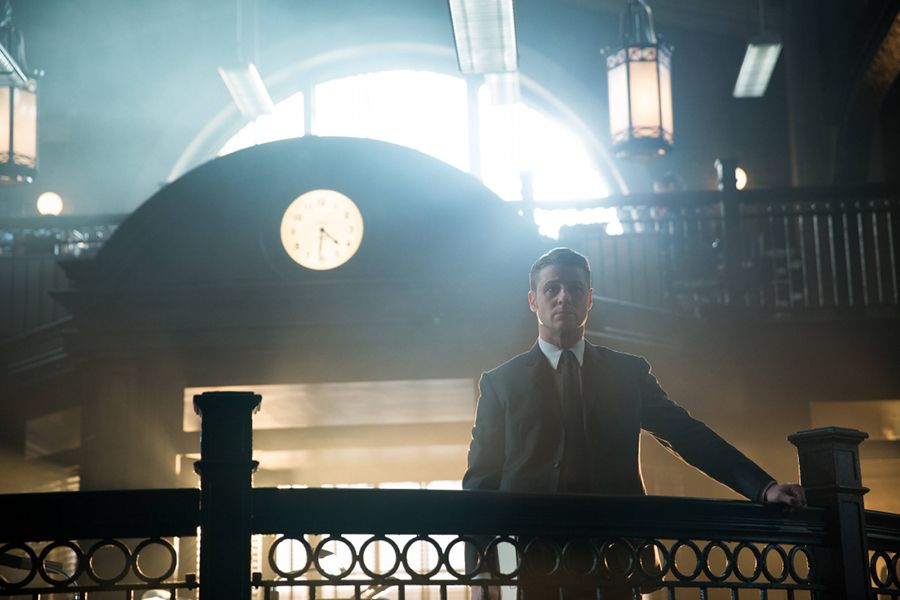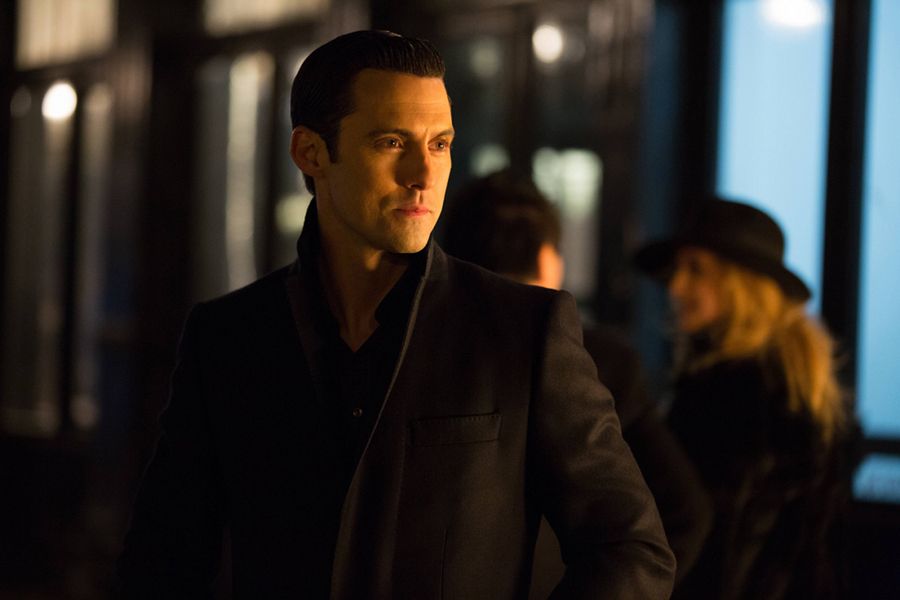Has Gotham changed?
That's the question running through the minds of the characters populating Fox's hit comic book drama, but it's also on the minds of Batman fans wonder what series would show up for the final four episodes. Across its first season, Gotham went from a dismally clichéd hour of TV to one that at least had moments of gonzo pulp spectacle to bolster interest. But would that turn be enough to end the year on a high note?
On screen, the question of change starts with Fish Mooney. Trapped inside the island asylum of deranged organ stealer and body horror fetishist the Dollmaker, the former gangster appears to have gotten with the program. But as she sweetly cares for the rich patients who come to the island for some black market materials, the calculating side of Fish comes back strong. Sneaking into the doc's office to root around, we start to see the first clues as to Fish's true motivation. But when she's caught by her sadistic jailer, doubt creeps in. Is Fish trying to escape, or is she truly desperate to die rather than become a Frankenstein doll? As the story drags on, the doubt diminishes quickly. Fish is, as always, scheming her way along in life. But the show tips its hand a bit too strong as she makes alliances with various factions of prisoners. Just as there's never truly a doubt that she'll execute a razor-sharp plan to steal Dollmaker's helicopter, there's no chance it'll go down any way except via a double-cross of the criminal element she's recruited in favor of saving her long-suffering civilian charges. At least her last minute confrontation with the doc – whom she sicks a pack of angry prisoners on – has the veneer of a genuinely surprising moment, Fish's time on the island ends flatly compared to its inane, eye-gouging heights from earlier this year.
Across the water in Gotham, Fish's former lackey turned unlikely mob heavyweight Oswald Cobblepot has definitely turned from the sniveling schemer we've seen all season. Finally with some dopey muscle to call his own, the Penguin spends the episode trying to buy a controlling interest in a dive bar owned by Mama Italian Stereotype. If that character is any indication, most of this story plays out in rote fashion, though it is fun to see Penguin finally own his ambition and cruelty in a way that his many last-minute survival attempts from earlier in the year never did. As he commands the fingers to be cut off the boyfriend keeping Mama's best girl off the straight and narrow, Oswald's more boss-like nature finally shines through, and series all-star Robin Lord Taylor's characterization remains perversely fun to watch on screen. But whether that change in confidence will hold as Penguin launches his plan to kill rival Boss Maroni in the bar as the finale draws near is another issue entirely.
The heroic side of the series seems to explore the question of change less from a result perspective and more from a challenging one, and it's all the better for it. Young Bruce Wayne takes it upon himself to follow the still-wounded Alfred's tip that the butler's old friend-turned-stabby assailant is back in town. After hitting a dead end due to his lack of drug addict terminology, Bruce taps his street urchin crush Selina Kyle to find the man who betrayed his best friend and demand to know who sent the would-be assassin to their home. The interrogation scene whereby the attacker's drug stash is dangled out a warehouse window drags on two times too long to keep its tension high, and after the man threatens the kids with retaliation once he's given up the name of his employer (the remarkable only for its oddness Sid Bunderslaw). As their threatening addict leans out a window to retrieve his precariously balanced stash bag, Bruce has a moment where he considers tossing the bum out to a quick death in order to cover their tracks. You can tell he considers this because child actor David Mazouz telegraphs the idea to the audience with ever acting! muscle in his little body. But the cheese-factor of this moment aside, when Selina finally does the deed that Bruce could not, an interesting moral dilemma is opened up for the hero-to-be. Could the boy who saw his parents murdered go along with a killing himself? We all know the answer to that, but watching him struggle with the question could prove entertaining.
And of course, as with all things Gotham, the show's quest to become something resembling a real drama falls to Jim Gordon. Finally having eked out a win in the corrupt GCPD, Gordon is approached by a young officer who seems ready to join his crusade holding a tragic but unsolved murder case. Despite the "don't upset the apple cart" pleas of his partner Harvey that you could set a clock to, Jim pushes forward and begins to dig at the story of a missing girl who turns up murdered after three months unseen.
Like most Gotham police cases, this one lacks in any kind of core procedural logic. Gordon and Bullock poke around at neighborhood bars on the flimsiest piece of "evidence" imaginable and come up with the fact that their victim was out with "a pretty good-looking guy." With that huge break in the case, the show spoon feeds the audience the actual backstory of the murder as suave psycho Jason Lennon (an admirably cool and collected Milo Ventimiglia) romances the girl to his apartment and then forces her to play house in handcuffs. Months later, he murders his charge for overcooking dinner and moves on to his next chance to find "unrequited love." Flashing back to the present, Bullock reveals that this serial killer – whose preferred name is "The Ogre" over anything that would make sense given his M.O. – has been well known to the department for a while, but no one ever goes after him because he'll attack their own families at the slightest provocation.
That bundle of non-mystery is capped by the umpteenth scene in the show's history where Gordon and Bullock confront a crooked cop in the locker room only to have him immediately give up why he tipped Gordon in the first place. Putting our man Jim on the radar of the Ogre was the plan of Commissioner Loeb, but Gordon is going to push on and try to catch both killer and Comish in a web because that's just what Gordon does. Despite the hint that our hero has had the slightest bit of impact on the G.C.P.D., his story and its predictable beats haven't changed at all.
And that's where Gotham seems to be after part one of its four-part finale run. Despite a few enticing moments (mostly delivered by the worthy villain Ventimiglia), the show continues to fall back on its more expected patterns. But with an endgame in the offing, the producers have a chance to ramp up the storylines they've set in motion here to give us a final episode that shows more of the bonkers Batman action we want.




